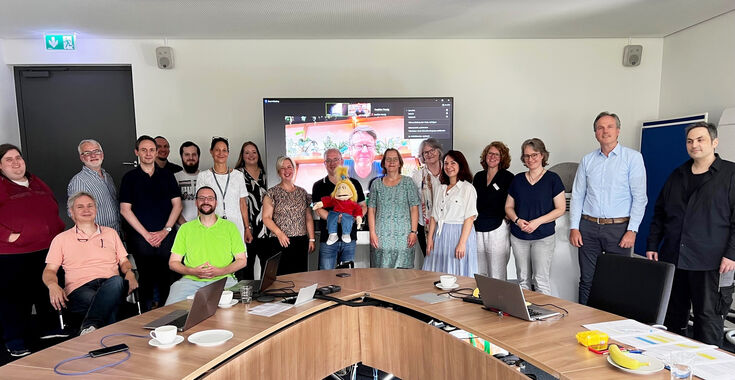A robotic doll supports people with dementia and their family caregivers - that is the idea behind the "RUBYDemenz" project. The Hochschule Niederrhein (HSNR) developed this puppet together with eight other project partners. At the end of August, the project ended with a final conference after three and a half years.
Emotional, personal, interactive and companionable - these were predetermined criteria for the development of the robotic doll. "RUBYDemenz" is intended to support and relieve relatives of people with dementia during home care. The doll with its numerous functions is individually adjusted to the person using it. In practical phases over several months, committed volunteers as well as people with dementia and their families have tested the doll.
The reactions of the people with dementia vary. Some are happy about the social contacts and the conversations with the companion and others are happy about the special thing. "Nobody believes me, I'm talking to a robot," says an elderly lady with dementia, and still others are fascinated by the technology. "The robot doll can converse with people, it can speak and (listen) and express emotions with facial expressions. With the help of cameras, it can recognize in which direction its counterpart is located and address the person specifically. With her presence, she can provide emotional support and encourage people with dementia to talk, play games or engage in activities, helping users to feel at ease," says Professor Dr. Edwin Naroska from the FAST competence centre at HSNR Niederrhein. The project was sponsored by the German Federal Ministry of Education and Research (BMBF) with around 2.3 million euros.
The Hochschule Niederrhein developed the "Puppet Technology" subarea with its Competence Centre for Research for Intelligent Assistance Systems and Technologies (FAST). The goal was to use artificial intelligence (AI), among other things, to enhance speech intelligibility and recognition as well as expressiveness. The puppet is to respond to touch. In addition, the "RUBYDementia" is to recognize positive and negative emotions and also be able to be connected to the television or telephone. Here, the HSNR is building on an existing system ("ELISA").
Now that the project has been completed, the project partners are already looking ahead, because "RUBYDementia" is of great importance from a social point of view: the number of care households is increasing, while the professional care system is reaching its limits. In addition, many nursing homes lack specialists. Therefore, the partners would like to push research and development to include further areas of application in society and new target groups.
The other project partners are:
Anasoft Technology AG, Bochum - joint coordinator
Dt. Rotes Kreuz, Bochum District Association e. V.
Matthies Spielprodukte GmbH & Co. KG, Hamburg
Rhine-Waal University of Applied Sciences, Kleve
FTK - Research Institute for Telecommunications and Cooperation e. V., Dortmund
Berlin University of Technology
Research Association for Gerontology e. V., Dortmund
University of Health, Bochum
For more information on the project, visit www.rubydemenz.de.


















